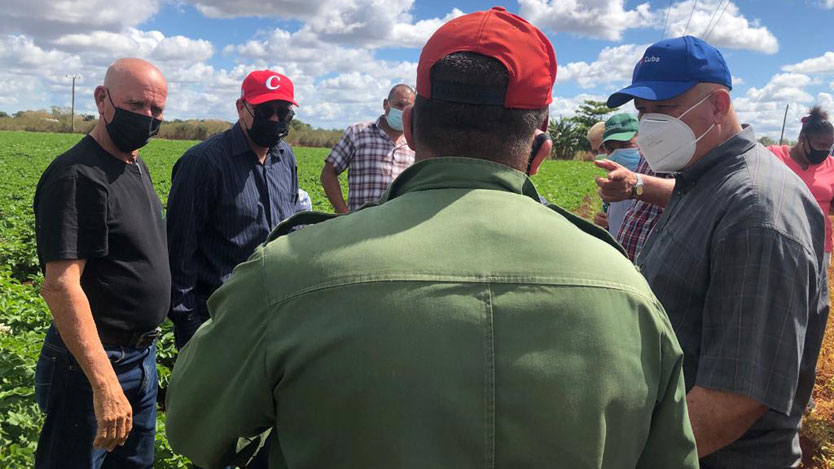
The ambitions of La Cuba cross borders, because with the 800 hectares (ha) of bananas that Ciego de Ávila has planted, it was supplied and could afford to send to other provinces. “And precisely for this reason, because it is already a consolidated productive pole, large investments have been proposed here and in others in Granma, Mayabeque, Matanzas…”, Vice Prime Minister Jorge Luis Tapia Fonseca pointed out, during a tour Monday through the areas of that Agricultural Firm.
At the rate of work there, it is expected in two years to reach 4,000 ha in which the banana fruit will occupy 3,000, while the plantain and the viand will divide the remaining 1,000. According to the director of the entity, Carlos Blanco Sánchez, with the minimum resources, these areas should contribute about 100,000 tons per year. "This was calculated for average yields of 20 tons per hectare because we, with fertilizers and drip irrigation, have managed to obtain 104 tons per hectare (t/ha) in the fruit," he emphasizes.
The challenge will be assumed by the three Agricultural Production Cooperatives that surround it and a Credit and Services Cooperative that brings together 74 usufructuaries, "although another 39 will be added to the 1,200 hectares that will be delivered to them and will have guaranteed irrigation, which will also take advantage of interspersing taro and other viands”, Orlando Pérez Pedreira, provincial delegate of Agriculture, advanced in his annual balance, days before the tour.
During the meeting, Orlando also mentioned the formation of labor groups, a management model that employs direct labor force to the results and that within the Agricultural Group of the territory had 30, at the end of the year.
Cuba is also ahead in this management and Rondilson Ramírez Rodriguez explained it from his banana plantations in one of the farms. He said "their" and Carlos Blanco did not correct him, "that is the idea, that they feel like owners."
The powers of this modality include being able to sell their products directly, import or export and agree on the distribution of profits among the members of the group, among others that stimulate Rondilson and the seven members of the farm where "a lot of work is done, but we feel very motivated. This is what it took to take off.”
Those were his statements and the words of Tapia Fonseca reinforced them. “Didn't you ask to unblock the obstacles, because they no longer have them, we eliminated bureaucracy, impediments, now it's up to you, you have to produce”.
According to the delegate of Agriculture, the measure could be "equated" with being a usufructuary, which without the certificate of the land; which is better, because then there is no limit of five caballerias.
After appreciating that experience, the entourage became interested in the other crop that is a priority in La Cuba: the potato. Half of the tuber of the entire province is planted there. 560 hectares, of the 1,130 that were planted.
The Vice Prime Minister asked about the distribution, because this Tuesday the harvest begins, so during Wednesday and Thursday it should begin to be sold in the first municipalities: Ciego de Ávila, Primero de Enero and Baraguá.
Carlos Blanco specified that they expect yields of 22 t/ha for imported seed potatoes and 17 for the national one, "indicators that are good and that should allow us to distribute about 12 pounds per person." However, Tapia clarified that, despite the commitments they have with other provinces and the intentions to market that quantity here, the start of the harvest does not yet allow any figure to be taken for granted.
The other nerve center of the province "forced" the Vice Prime Minister to leave the fields of La Cuba and reach the Primero de Enero sugar mill, which a week ago was forced to take up the fight, after Ciro Redondo and the Bioelectrical Plant will demonstrate, once again, their incompatibility.
There he gave precise instructions: make the most of time and try to grind the greatest amount of cane in Ciego de Ávila. He directed moving transportation from the Ciro Redondo plant to the colossus of Primero de Enero, since the delay in the arrival of parts could delay the new start of Ciro Redondo Factory (scheduled for the end of March). Likewise, he wondered why they did not increase the haul by trains, when the trucks from the central Brazil, in Camagüey, to the municipality of Ciego de Ávila, took more than two hours due to the state of the roads and, on top of that, added inefficiency to the transfer.
One of the agreements was that. Increasing delivery by rail, which should increase the contribution to an industry that this week, except for one day, has ground above 90 percent of its norm. “But the idea is not to stop and reach 100”, Tapia encouraged.




